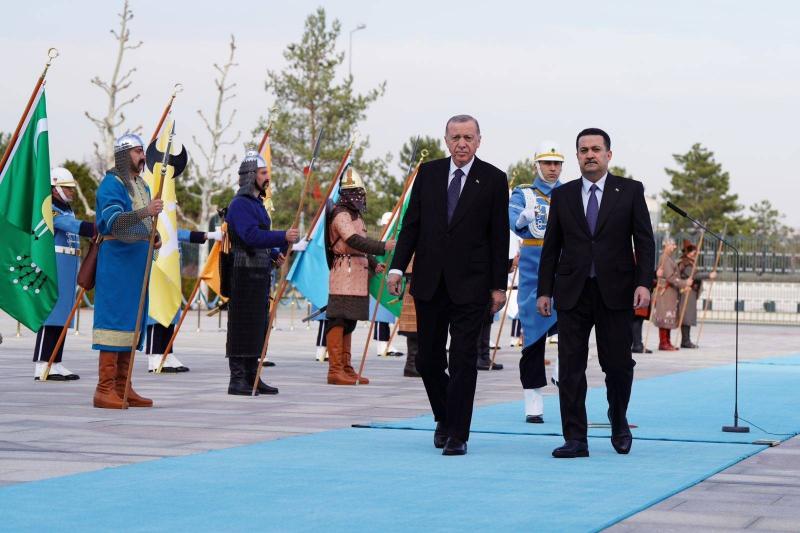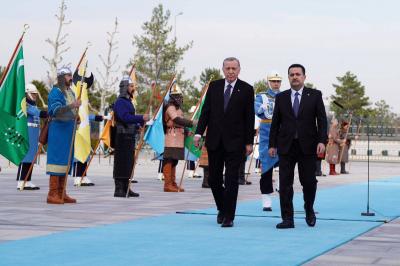With Turkish President Recep Tayyip Erdogan's visit to Iraq approaching, scheduled after Ramadan and before the end of April, the pro-government Turkish newspaper "Yeni Şafak" revealed outlines of an initiative to enhance military cooperation between the two countries. This initiative includes the establishment of a joint military operations center to secure borders and eliminate "terrorism" from the region. According to the newspaper, Turkish Defense Minister Yaşar Güler will visit Iraq in a few days to discuss security and military coordination steps in preparation for Erdogan's visit, as well as to review collaborative measures, particularly in intelligence cooperation, logistical support, and training.
Two government delegations from both countries are expected to meet to determine the locations of the Kurdistan Workers' Party (PKK) in northern Iraq, planning to select a safe area from which to control military operations to establish the joint operations center. The priority will be on regions where the PKK is concentrated, specifically in Qandil, Sinjar, Makhmur, Sulaymaniyah, and Gara in northern Iraq.
### Four Complex Files
The visits of Turkish officials and their consecutive movements in Iraq have contributed to refreshing the stagnant relations between the two countries, serving as preliminary steps for Erdogan's anticipated visit to Baghdad. This will outline the work agenda between both sides. Four key issues are evident in the current trajectory of Iraqi-Turkish relations: the PKK issue and the necessity for joint efforts to defeat it; the "Development Road" project, which places Iraq back on the global trade map; the water issue; and the oil export file via the Iraqi-Turkish pipeline. Addressing these issues could provide a good opportunity to reshape Turkish-Iraqi relations on a win-win principle, realigning their interactions correctly.
### The Water Issue
The water issue is a major challenge between Iraq and Turkey, with both countries considering water a strategic resource. The Euphrates River is a primary water source in the region, and Iraq relies heavily on its flow for agricultural irrigation and providing fresh water for human consumption. Iraq has been facing a severe drought crisis for years, causing large areas of agricultural land to become unproductive, while Turkey itself experiences water resource shortages in some regions, making water allocation between the two nations increasingly critical, alongside Syria.
The problem traces back to dams Turkey has built on the Euphrates River, affecting water distribution and usage in Iraq. These include the Ilısu Dam, Atatürk Dam, and Kışla Kaya Dam, which reduce water flow to Iraq and impact the country's water supply. Estimates indicate that Iraq's allocation has declined from approximately 73 billion cubic meters in 2003 to 50 billion cubic meters in 2020 due to the filling of Turkish dams, and it could further decrease significantly in the coming years if Turkey's water exploitation plans remain unchanged.
Turkey blames Iraq for misusing its water resources and not upgrading irrigation systems, asserting that its management of water issues responds to local economic needs and international laws. This topic has become prevalent in most meetings between the parties and has gradually taken on a political dimension that affects and is affected by other issues.
Both countries are trying to conduct discussions and negotiations to reach agreements that fairly regulate water usage and distribution. A framework agreement between Turkey, Iraq, and Syria was signed in 2014 aimed at enhancing cooperation in the management and distribution of water. However, the issue remains unresolved and requires ongoing efforts to reach sustainable solutions that meet the needs of all parties while preserving water resource sustainability in the region.
### The PKK Issue
Iraq and Turkey share the necessity of confronting security challenges, including combating terrorism and extremism. However, their relations are sometimes affected by their approaches to dealing with these challenges. A prominent example is the issues involving Kurds in border areas, and Turkey's operational interventions in these regions of Iraq to combat "terrorism" without prior notification. During his recent visit to Iraq, Turkish Foreign Minister Hakan Fidan urged the Iraqi government to officially designate the PKK as a terrorist organization, which observers say reflects an attempt to pressure Baghdad into taking a clearer position on this issue.
Turkey monitors the Iraqi government's dealings with Iranian opposition groups in Iraqi Kurdistan, aware of the implications of the security agreement between Tehran and Baghdad in this regard, and Baghdad's commitment to disarm these groups, strengthening Ankara's demand for Baghdad to take a similar stance regarding combating the PKK as a terrorist organization.
The positions of Iraqi Kurdish parties regarding the PKK are diverse, adding to the complexity of the situation. While the ruling Kurdistan Democratic Party in Erbil and Duhok tends to align with Turkey and pursue the PKK, the Patriotic Union of Kurdistan, dominant in Sulaymaniyah, maintains good relations with the PKK, which Turkey accuses of providing a safe haven for its elements. Tensions between Turkey and the Patriotic Union of Kurdistan escalated to the extent that in April, Turkey decided to close its airspace to flights from Sulaymaniyah, with the closure remaining despite repeated calls for its reopening.
### Iranian Influence
Turkey aims to cooperate with the democratically elected Iraqi government, regardless of its religious affiliation, and supports the stability and unity of Iraq as a multi-ethnic and multi-religious state. Turkey recognizes the dangers posed by Iranian influence in Iraq as a threat to regional balance and security, frequently expressing concern over Iran-aligned groups and their impact on Iraq's internal affairs.
Ankara works to build close relationships with Sunni elements in Iraq, especially political and military forces that oppose Shiite influence, believing that national unity and solidarity in Iraq are the best ways to face security and political challenges. Overall, Turkey's stance on Shiite threats in Iraq involves balancing its concern regarding Iranian influence with efforts to cooperate with Iraqi national elements to enhance stability and national unity.
On the Iraqi side, Prime Minister Sudani's desire to develop the country's infrastructure, launch major economic development projects, and resolve security issues necessitates addressing Turkish demands seriously and striving for settlements with Ankara. Sudani is credited—with mixed success so far—for maintaining a balanced position between various Iraqi parties involved in relations with Turkey, particularly the Kurdistan Region and factions loyal to Tehran.
### The Path of "Development"
The "Development Road" project promoted by Turkey has full Iraqi endorsement, but it interacts with other files, particularly trade between the two sides. Turkey has officially announced its support for the project, yet no clear agreement on its implementation currently exists, particularly regarding points of contention between the two sides about the Iraqi demand that the road enter Turkish territory from the Fish Khabour point, avoiding the Kurdistan Region.
Kurdish officials oppose Baghdad's attempts to exclude the region from the project's route, which could weaken the region's geopolitical value and negatively impact its trade role with Turkey. Turkey seeks to avoid the complications arising from the disputes between Kurdistan and Baghdad regarding the road's path. The Prime Minister of the Kurdistan Region, Masrour Barzani, affirmed during his meeting with the Turkish foreign and energy ministers that the project should proceed with the consent and cooperation of the Kurdistan Region.
According to the latest statistics, Turkish exports to Iraq reached $14 billion in 2022, with Turkish aspirations to increase this figure. Turkey is looking to tie its position on the "Development Road" to gaining more commercial and investment privileges in Iraq, as this route provides opportunities amid competition from Iran and China in the Iraqi market, along with the gradual entry of Arab Gulf states into this market.
### Erdogan and the Grand Deal
It is well-known in Turkish diplomacy that Erdogan's foreign visits inaugurate significant deals, which enhances the win-win scenario, suggesting that the Iraqi government will adopt a stricter stance toward PKK activities in Iraqi territory and work jointly with Turkey to eliminate it from areas under its control. This may require convincing Iraqi factions of the benefits of this deal and reaching settlements with the Kurdistan Region and its main parties on one hand, and the Iran-aligned factions on the other.
As Erdogan's visit approaches, avoiding these problematic issues is no longer the best option for both parties, given Turkey's need for a positive regional atmosphere during Erdogan's new presidential term, which means "zero problems." This is particularly important amid the challenges surrounding normalization with Damascus, making relations with Baghdad crucial for securing its extensive border with Iraq, in addition to the evident economic and trade benefits for both countries through the "Development Road."




